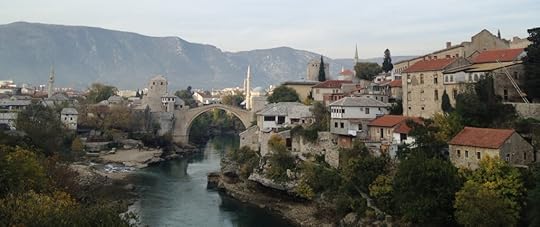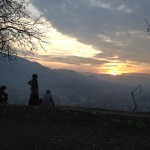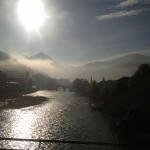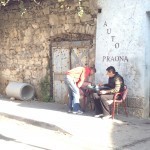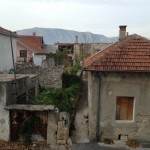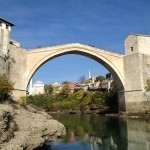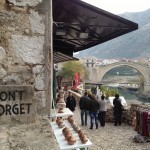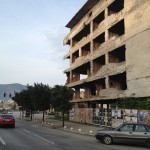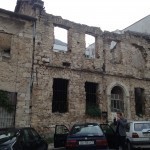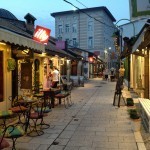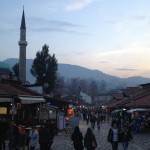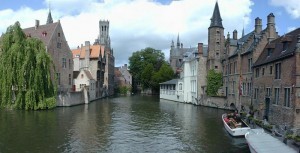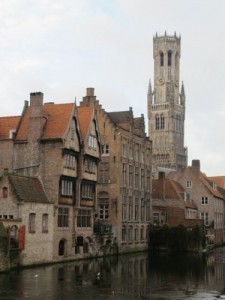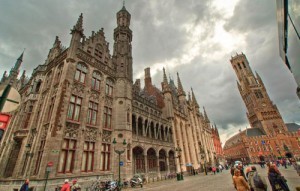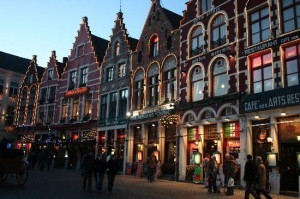Rolf Potts's Blog, page 75
November 24, 2012
Getting Vagabonding or Marco Polo as stocking-stuffers
Vagablogging :: Rolf Potts Vagabonding Blog
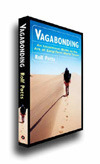
It’s once again winter holiday season, which means it’s time to tout my books as stocking stuffers for the travel lovers on your Christmas list.
Vagabonding makes a great holiday gift for:
College or high school students nearing graduation.
Twenty- and thirtysomethings who don’t like their jobs, are currently between jobs, or are considering a sabbatical from work.
Friends and family members who don’t quite “get” the gift-giver’s urge to travel.
Anyone who dreams of (or has talked about) long-term travel, but thinks they’re too poor, busy, disorganized, afraid, uninformed, or old/young to actually do it.
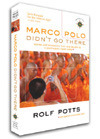
And of course my newest book, Marco Polo Didn’t Go There, is not just an entertaining and engrossing read for the armchair traveler; its “commentary track” makes it an offbeat travel-writing textbook for students and fans of the genre.
Both books should be available through your local bookstore — and for online ordering you can the follow the links I’ve set up here:
http://www.rolfpotts.com/marco/
I do have a limited number of signed copies available, but since I’ll be away from home for the next couple weeks this will be a last-minute undertaking.
So if you don’t mind waiting for the signed copies until, like, the week after Christmas, send an email to books [at] rolfpotts [dot] com to get ordering details.
Original article can be found here: Getting Vagabonding or Marco Polo as stocking-stuffers
November 23, 2012
Vagabonding Field Report: Yugoslavia may be gone, but the Yugo remains in Bosnia and Herzegovina
Vagablogging :: Rolf Potts Vagabonding Blog
Cost/day: $45/day
What’s the strangest thing you’ve seen lately?
People still drive the Yugo here – commonly known as the worst car in history. I learned a few Yugo jokes while here: How do you instantly double the value of a Yugo? Fill up the fuel tank. Why are there rear-window heaters in the Yugo? To warm your hands while you push it.
Describe a typical day:
I got up early in Sarajevo to take the train to the scenic town of Mostar. I missed the train because it left at a different time than they originally told me. This kind of miscommunication is of course expected when travelling and I simply took the bus instead. I arrived a little over two hours later and began exploring Mostar’s rich and tragic history from the Bosnian War. I sat along the picturesque river to eat ćevapi, drink Sarajevsko beer and admire the beautiful scenery of the Old Bridge. I reflected for a while how blessed I was to be able to travel to such amazing places (it was probably the Sarajevsko talking at that point). After a full day of exploring Mostar, I get on the train – receiving the right departure time – and travel back to Sarajevo. I sat next to a NATO soldier on the train and had a great talk with him about the current political situation and the region. I get to Sarajevo at night and go out for dinner and sample the nightlife.
Describe an interesting conversation you had with a local:
I spent the day with a guy who was a child during the Bosnian War. He told me many stories about what life was like during those times. For over three years, he was almost never allowed to leave the basement and would often go several days without food as he heard constant explosions and gun shots outside of his home. He now studies political science and had a very unique perspective as someone who has both lived through the conflict and studied it.
What do you like about where you are? Dislike?
I liked the rich culture – it was a unique blend of Turkish, Mediterranean and European. The food was delicious, the people were friendly and the scenery was amazing.
I disliked the sad and recent history. While it was interesting from an educational and historical perspective, it was sad because most of the people there actually lived through it and it was very present. You could see bombed out shells of buildings and bullet holes on nearly every corner. In Sarajevo, the “Sarajevo rose” – where they filled mortar holes with red paint where 3 or more people died – could be seen on many of the streets.
Describe a challenge you faced:
There were no challenges – it was a very smooth and pleasant trip! Boring answer, I know.
What new lesson did you learn?
As seen time and time again, when people are able to work and improve their quality of life, they rarely fight. It’s when conditions are tough that citizens are susceptible to brainwashing from power hungry politicians that highlight ethnic differences and assign blame. Once Yugoslavia began to implode and the economy collapsed, radical political leaders fueled ultra-nationalism and ignited a brutal civil war here in order to grab power and land, conducting ethnic cleansing genocides in the process.
Where next?
Moscow, Russia. You can follow me on Twitter or my blog to learn more about my travels (or about this particular trip).
Original article can be found here: Vagabonding Field Report: Yugoslavia may be gone, but the Yugo remains in Bosnia and Herzegovina
Yugoslavia may be gone, but the Yugo remains in Bosnia and Herzegovina
Vagablogging :: Rolf Potts Vagabonding Blog
Cost/day: $45/day
What’s the strangest thing you’ve seen lately?
People still drive the Yugo here – commonly known as the worst car in history. I learned a few Yugo jokes while here: How do you instantly double the value of a Yugo? Fill up the fuel tank. Why are there rear-window heaters in the Yugo? To warm your hands while you push it.
Describe a typical day:
I got up early in Sarajevo to take the train to the scenic town of Mostar. I missed the train because it left at a different time than they originally told me. This kind of miscommunication is of course expected when travelling and I simply took the bus instead. I arrived a little over two hours later and began exploring Mostar’s rich and tragic history from the Bosnian War. I sat along the picturesque river to eat ćevapi, drink Sarajevsko beer and admire the beautiful scenery of the Old Bridge. I reflected for a while how blessed I was to be able to travel to such amazing places (it was probably the Sarajevsko talking at that point). After a full day of exploring Mostar, I get on the train – receiving the right departure time – and travel back to Sarajevo. I sat next to a NATO soldier on the train and had a great talk with him about the current political situation and the region. I get to Sarajevo at night and go out for dinner and sample the nightlife.
Describe an interesting conversation you had with a local:
I spent the day with a guy who was a child during the Bosnian War. He told me many stories about what life was like during those times. For over three years, he was almost never allowed to leave the basement and would often go several days without food as he heard constant explosions and gun shots outside of his home. He now studies political science and had a very unique perspective as someone who has both lived through the conflict and studied it.
What do you like about where you are? Dislike?
I liked the rich culture – it was a unique blend of Turkish, Mediterranean and European. The food was delicious, the people were friendly and the scenery was amazing.
I disliked the sad and recent history. While it was interesting from an educational and historical perspective, it was sad because most of the people there actually lived through it and it was very present. You could see bombed out shells of buildings and bullet holes on nearly every corner. In Sarajevo, the “Sarajevo rose” – where they filled mortar holes with red paint where 3 or more people died – could be seen on many of the streets.
Describe a challenge you faced:
There were no challenges – it was a very smooth and pleasant trip! Boring answer, I know.
What new lesson did you learn?
As seen time and time again, when people are able to work and improve their quality of life, they rarely fight. It’s when conditions are tough that citizens are susceptible to brainwashing from power hungry politicians that highlight ethnic differences and assign blame. Once Yugoslavia began to implode and the economy collapsed, radical political leaders fueled ultra-nationalism and ignited a brutal civil war here in order to grab power and land, conducting ethnic cleansing genocides in the process.
Where next?
Moscow, Russia. You can follow me on Twitter or my blog to learn more about my travels (or about this particular trip).
Original article can be found here: Yugoslavia may be gone, but the Yugo remains in Bosnia and Herzegovina
November 22, 2012
Thanksgiving overseas: Belgian beer in Bruges
Vagablogging :: Rolf Potts Vagabonding Blog
Growing up in the Midwest, my Thanksgiving was the traditional spread of turkey, stuffing, and pumpkin pie, devoured at a relative’s home in suburban Chicago. But I grew up to be an inveterate traveler and spent the holiday in many places—one of the best was the historic, colorful Belgian city of Bruges.
Several years ago I was serving an internship at the US Embassy in London, and received a four-day weekend as per Federal law. I packed a bag, recruited a friend, and took advantage of the holiday to visit one of my favorite Northern European locations.
Bruges is a lovely little time capsule, a prosperous medieval port city that saw its fortunes vanish when its waterway silted up. The city’s centuries of slumber had an unintended boon for twenty-first century travelers: its cathedral, cobbled alleyways, picture-book canals, and magnificent Market Square survive to thrill romantics and history buffs alike.
My friend, a fellow American who was visiting me from back home, had never heard of the place. This presented another great opportunity I relished: playing tour guide in Europe. At first she was skeptical of spending the holiday in an unfamiliar city, but seemed to warm to the idea when told that Belgium makes the finest chocolate and beer in the galaxy (in fact, Belgium has almost as many beers as there are days in the year).
Having won her interest, we met up in London on a Wednesday, flew to the Brussels and caught a train to Bruges. A steady rain greeted us as we settled into a little bed and breakfast I’d enjoyed on a previous visit. I promised my exhausted buddy that tomorrow would be a lot more fun.
Thanksgiving was spent showing my hometown friend some of Bruges’ charms, like the bell tower that has overlooked the Market Square since 1300, the gorgeous Crusader-financed Basilica of the Holy Blood, and the terrific Gruuthuse Museum housed in the former home of a wealthy medieval merchant. Under a chilly drizzle, we munched on hot, greasy French fries from a stand in the Market Square and then checked out the Michelangelo kept in a nearby church. A major part of the experience was, of course, browsing the numerous chocolate shops lining the alleyways just off the colorful square.
Our thanksgiving feast was in a little Italian café off a cobbled lane, where a pizza was washed down with a delicious locally-crafted strawberry-flavored beer (Frambozen). Dark chocolate, freshly made by a nearby confectioner’s, was the dessert. After introducing my pal to a few more fine Belgian beers (Trappist monk-brewed dark, and a white beer called Dentergems), a post-feast stroll around the backstreets capped off the night. The following Sunday I returned to London while my friend flew home to Chicago with a bagful of pralines, a hangover, and a few good stories.
I’ve had many interesting Thanksgiving experiences before and since, but my holiday spent in the historic, idyllic little Belgian city still brings a smile. Stuffing and family is great, but I really miss that beer.
Original article can be found here: Thanksgiving overseas: Belgian beer in Bruges
Edgy travel with Tony Wheeler
Vagablogging :: Rolf Potts Vagabonding Blog
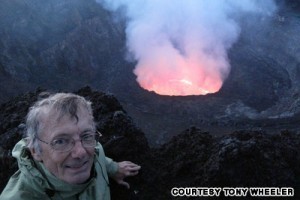
Lonely Planet guidebooks have inevitably become the kind of extra weight I rarely want to put in my backpack anymore. Why? Because they lead a traveler to the same ol’ tired paths everybody else is going to: a kind of one way ticket for jaded travel entertainment made up of bars, guesthouses and a bunch of other Western –albeit of course interesting! – travelers..
And I was in fact quite pleased when I discovered this article , as it appears that Tony Wheeler, Lonely Planet founder, and I, share a similar vision. We get excited by the marginal travel zones, and we like to travel down and low, keeping a clear philosophy: talk to the local people you meet on the way.
Citing the article, “When it comes to deciding where to go there’s just one qualifier — it’s got to be edgy. The sort of place that isn’t just a challenge to get into, its even risky to be in. Political instability, corrupt police and active volcanoes all add to the thrill.” In 2010 Wheeler already published “Bad Lands”, a book about his travels in countries such as Iran, Iraq, North Korea, Afghanistan, Saudi Arabia and Lybia.
I recently completed an overland Jaunt from Singapore to Milan, having my own fair share of great, untamed adventures: getting local with Central Asian families, hitching most of the Silk Road’s main route, camping outside of trafficked border zones, and also getting maybe too close to a real street mobbing on the Iranian-Turkish border – an experience I recalled on Vagabonding just here -.
And I have to say that, without being a fool, I share Wheeler’s excitement for those places where “you read the press and it seems like a disaster and then you get there and things aren’t so bad,” he said in the article, concluding with “Touch wood.”
For me, approaching a destination that will invariably offer me an almost authentic experience of the place because of the relatively tourist-infrastructure free society is a godsend gift. It may be because I have already visited quite a number of countries – including many that never make the bad , shocking headlines – and I am continuously looking for the best authentic, almost anthropologic experience I can get. What do you think? Are you a Ferrarese/Wheelerian or not? Please comment below.
Original article can be found here: Edgy travel with Tony Wheeler
November 21, 2012
Vagabonding Case Study: Nicole Rosenthal
Vagablogging :: Rolf Potts Vagabonding Blog
Nicole Rosenthal
Age: 23
Hometown: Temecula, California
Quote: “Just because something is scary, doesn’t mean it isn’t doable. You are stronger than you think..”
How did you find out about Vagabonding, and how did you find it useful before and during the trip?
As an avid travel blog reader, I had stumbled upon Vagabonding. What a great find! It wasn’t so hard to find, however, since it is such an important resource to the travel community. I find it helpful to gain inspiration as well as stay current in travel topics.
How long were you on the road?
I don’t technically consider myself off the road just yet. I currently have lived in France for about a year and 9 months and travel every chance I get—sometimes 2 or 3 times a month.
Where all did you go?
Italy, Spain, France, England, Holland, Belgium, Ireland, Germany, Denmark, Hungary, Czech Republic, and Thailand
What was your job or source of travel funding for this journey?
I work for a French destination management company as a Project Manager
Did you work or volunteer on the road?
I have just maintained my current job at the French company
Of all the places you visited, which was your favorite?
This is tough. I can find beauty and amazing memories in each location. I guess I have to go with my most recent destination,Thailand, specifically the North. Visiting Southeast Asia was so different than anything I have ever done. Of course, each country I visit unlike the other; but up until my trip to Thailand I had only visited Western cultures. Thailand was raw and real. The North is not as built up as other parts as Thailand but even in the most touristy parts you can still see the everyday life of Thai people. There isn’t really a façade and I loved that. Plus, there is incredible food and kind people!
Was there a place that was your least favorite, or most disappointing, or most challenging?
My least favorite and most challenging are 2 different places. My least favorite definitely has to be Bilbao, Spain. But I think it is because I visited when all the locals were on holiday. It was honestly a ghost town. One of my favorite parts of travelling is experiencing the culture and talking with the locals. This was impossible in Bilbao because no one was there!
My most challenging place is Paris. There is nothing easy about trying to live and work in this city. Even going to the post office can be a challenge! I love it here but it is definitely not easy living
Did any of your pre-trip worries or concerns come true? Did you run into any problems or obstacles that you hadn’t anticipated?
Because I have traveled a lot, I don’t really have many pre-trip jitters. I am used to the uncertainties and unfortunate events that may happen when in a new place. They don’t worry me so much anymore—I just go into solving problem mode. I was a bit scared when going to Southeast Asia as far as getting vaccinations and such but it turned out to be a lot less scary place than I had imagined!
Which travel gear proved most useful? Least useful?
TOMS and my backpack with a rain cover are wonderful. For colder destinations, under armor is light weight and keeps you warm. Money belts or passport holders are not worth it. Oh and a pack of tissues always come in useful.
What are the rewards of the vagabonding lifestyle?
I probably could go on forever on this one. Once you break out of your comfort zone, you learn the most. Vagabonding is constantly making you adapt and experience new things. By having to undergo these changes, you learn something about yourself and the others around you. Viewpoints are broadened and understanding is deepened. You learn so much not only about the world but also about yourself. You get to experience new cultures, foods, languages… Everyday is different and you do your utmost to take everything out of each day rather than getting in a slump.
What are the challenges and sacrifices of the vagabonding lifestyle?
Life is constantly moving and so are the people in it. It is hard being away from my family. Now, I am at the age that my friends are getting married or having babies and I can’t be around for those moments. Sometimes it is hard to justify the sacrifice of missing important moments in the lives of your loved ones. Also, if I do ever decide to go back, I know if will be difficult. I have changed so much and so has my life. It will be a challenge to re-assimilate.
What lessons did you learn on the road?
Life is unpredictable and you need to be flexible. There is no point to stress over things you cannot control. If you try hard enough for something and be persistent, you can get it. Don’t let obstacles change your goals. Find a way around them and keep trying—one day you will reach what you want. No matter where you go you will find similarities in people but their differences are even more beautiful. Enjoy every second of your life the way it is now because it could change at any moment. Don’t let the bad things bog you down; learn from them and move on. There is always something you can learn from the people you meet—let them teach you. Just because something is scary, doesn’t mean it isn’t doable. You are stronger than you think.
How did your personal definition of “vagabonding” develop over the course of the trip?
At first, it was sort of temporary. I was only supposed to move here a year and now I can’t break away from this life. I thought of it as a year of fun and adventures. Now I realize that there are hardships and negatives to any lifestyle you chose. It isn’t all ups, there are downs you go through as well. However, there the idea of it all being worth it has never changed.
If there was one thing you could have told yourself before the trip, what would it be?
You are stronger than you think. Everything will work out. The obstacles and challenges in your way will only make it more worth it in the end.
Any advice or tips for someone hoping to embark on a similar adventure?
Just do it. I can’t tell you how many people tell me “how lucky” I am or that they wish they could do this. There is nothing different between you and me. I was scared, unsure, not rolling in cash, and had other commitments. But I did it and you can too. If you want it bad enough, you can make it happen. Create your own ‘luck.’ Plus, it isn’t as scary as you think. Life will work out if you let it.
When and where do you think you’ll take your next long-term journey?
I am actually thinking of spending several months in Southeast Asia starting this December or January. My recent trip was too short and opened my eyes to a whole new area I need to explore. Although I get to travel a lot, I want to have a extended backpacking trip and explore somewhere for more than a 2 week holiday.
Website: misscocomarie.com
Twitter: misscocomarie
Are you a Vagabonding reader planning, in the middle of, or returning from a journey? Would you like your travel blog or website to be featured on Vagabonding Case Studies? If so, drop us a line at casestudies@vagabonding.net and tell us a little about yourself.
Original article can be found here: Vagabonding Case Study: Nicole Rosenthal
November 19, 2012
What level of risk will you accept?
Vagablogging :: Rolf Potts Vagabonding Blog
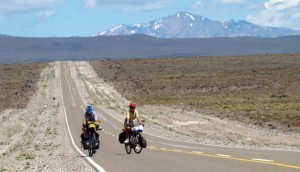 I was chatting on Facebook one day with a fellow traveler. She made a comment that left me speechless, horrified, and quaking in my boots. Her daughter had not been immunized. Against anything. Ever.
I was chatting on Facebook one day with a fellow traveler. She made a comment that left me speechless, horrified, and quaking in my boots. Her daughter had not been immunized. Against anything. Ever.
“People get sick because their immune system is weak,” she told me. “My daughter is very healthy.”
Now here’s the thing: I think not immunizing your child is way too high a risk to take. She thinks biking around the world is dangerous. Who’s right? We both are.
“You see the world through lenses tinted by your experience,” someone once said. And it’s that experience that guides us in making decisions about what’s dangerous and what’s not.
She had seen more people harmed by vaccines than by the diseases. I had seen way too many people crippled by polio. Her experience led her to make the decision not to immunize; it was too high of a risk. My experience led me to get vaccinations for my sons as soon as I could – not doing so was simply an unacceptable level of risk.
“I am so scared for you,” she told me frequently as we cycled the length of the Americas. “What you are doing is so dangerous!” Her experience told her biking is full of danger. Her brother was killed by a car while taking a break from biking and standing on the side of the road taking off his shirt. She hit a trash can while biking one night and seriously broke her arm which led to major surgery and nerve damage.
And yet my experience told me biking is fine, and biking around the world was no more dangerous than biking back home. I have cycled thousands of miles; my husband many thousands of miles more. As a family we’ve pedaled nearly 27,000 miles. In all that time, we’ve had four minor accidents.
Our experience tells us that most accidents happen near home and the accident rate is very low – in other words, it’s an acceptable level of risk. I’ll happily jump on my bike and pedal from one end of the earth to the other, but take an unvaccinated child out traveling? Uh uh. No way. Not in a month of Sundays.
We all have those ideas – some things simply appear more dangerous to us than to others. I shudder to think about kids riding motorbikes, yet many of my students regularly suited up and hit the tracks in races. Jumping over barriers on horses terrifies me. And don’t even get me started on car racing. And yet there are many parents out there who, based on their many and varied experiences with those activities, deem them fine. Who am I to judge?
What lenses are you seeing the world through? What things will you allow your children to do that other parents won’t? What activities have an unacceptable level of risk to you?
Nancy Sathre-Vogel is the “Mom” to Family On Bikes. Family On Bikes is just your everyday, American family who happens to be following their dreams and chasing rainbows. They are adventure-seekers and modern-day explorers who are limited only by their imaginations—and they have very vivid imaginations! They learned early to grab life by the horns and live it to the fullest—to, literally and figuratively, enjoy the ride. The Vogel Family’s most recent adventure was cycling 17,300 miles from Alaska to Argentina.
Original article can be found here: What level of risk will you accept?
Bargaining in Asia: tips and tricks
Vagablogging :: Rolf Potts Vagabonding Blog
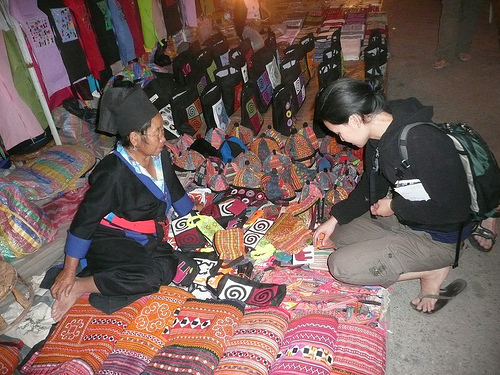
A fabric vendor and traveler at a market in Luang Prabang, Laos. Photo: Joaquin Uy / Flickr
It’s a well-worn practice the world over: customers and vendors talking price. CNNGo tackled this issue in a post titled How to bargain: the ultimate guide to scoring a deal in the markets of Asia.
Many of the tips will be familiar to experienced vagabonders: shop around, be polite, and be ready to walk away. What makes the article special is the little details about particular destinations. Some examples:
The superstition over the first sale of the day and how it’s phrased in Cantonese and Thai.
The term that Indians for overcharging travelers is called the “Skin Tax.”
When to get discounts in the non-haggling culture of Japan.
Have you negotiated over a purchase at a market? Please share your stories in the comments.
Original article can be found here: Bargaining in Asia: tips and tricks
November 18, 2012
Much of what we experience as travelers is mired in the imaginary
Vagablogging :: Rolf Potts Vagabonding Blog
“What [tourists] bring to New Guinea, reinforced by the travel brochures, is clearly imaginary, that is, it is not based on any real assessment of the New Guineans, but is rather a projection from Western consciousness, with the reminder that the only way to explore the real is through one’s symbolic system. The tourists say that the indigenous people do not think about tomorrow, that they are “primitive,” that their lifeway is “so opposite to that of Europe,” all of which suggests the image of the happy savage and the natural man, close to nature, not yet burdened by the oppressions of European civilization. The New Guineans, in turn, in their sing-sings and performances put on for the tourists, do not display their real, but rather the New Guinean performance mirrors for the Europeans what the tourists desire. This mirroring is not a condition conducive to learning. According to Lacan, it does not work well in psychoanalysis and cannot lead to understanding of other cultures in tourism, because one never penetrates from the imaginary to the symbolic. The Europeans cannot progress to a more realistic appreciation of the New Guineans, because the Other reflected back to them is their own imaginary projection. They are trapped in a loop, in never-ending reflections from multiple mirrors.
–Edward M. Bruner, “Transformation of Self in Tourism,” Annals of Tourism Research, Vol. 18, No. 2 (1991)
Original article can be found here: Much of what we experience as travelers is mired in the imaginary
November 17, 2012
Vagabonding Field Report: Getting chased by a pack of dogs in Banos
Vagablogging :: Rolf Potts Vagabonding Blog
Cost/day: $15
What’s the strangest thing you’ve seen lately?
If I could have seen myself, it would have been me as I climbed over a fense into a field with a bunch of cows to go around a pack of angry dogs that were on our hiking trail and scared the stuffing out of me when they started to chase me off their path.
I know the cows thought I looked funny trying to quietly sneak through their pasture since they made a fuss and blew my cover and attracted the pack’s attention. Darn cows!
Describe a typical day:
Banos is a small little town with some fun trekking options as well as natural hot springs. A typical day has a small bread breakfast and a packed lunch before heading out into the surrounding hills to do some day hiking. Usually the packed lunch is eaten overlooking a waterfall or the town itself. In the afternoon, we will sometimes go to a local cafe which shows a random movie each day and draws a fun crowd of locals and travellers alike. The evenings are usually spent with pretty much everyone else in town at the local hot springs. It’s cheap and a nice way to enjoy the cool evening air (without getting cold).
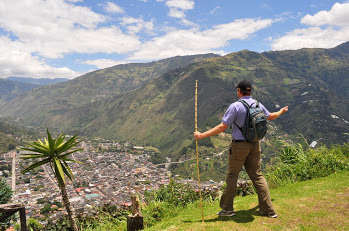
Describe an interesting conversation you had with a local:
South American kids are adorable and if you spend any time on the buses, odds are you’ll have one in your lap before the trip is done. The smart parents are happy to unload their kids for an afternoon onto some stranger who can entertain them with an iphone for hours.
This one young girl basically hopped into my lap on the way to Banos. She asked me where my children were (don’t have any) and then why I didn’t have any children since I was married. That was not an easy question to answer.
We talked a bit about Canada before I brought out my iPhone and we started using a paint application to draw shapes and people. She was adorable. She would “wipe” the iPhone paint off her finger on my sleeve before changing colours for her pictures.
Honestly, kids make for the best conversations while travelling.
What do you like about where you are? Dislike?
Banos is a beautiful little town. The natural beauty of South America continues to stand out. Also, away from the Galapagos, Ecuador is quite affordable.
As for dislikes, I didn’t like getting chased off my hiking path by a pack of dogs! That’s an easy one. There are so many stray and domestic dogs in South America you get used to being barked at. But this pack was different and took their aggression to the next level. Not having my rabies shot meant I was in no mood for a nasty bite and I made a run for it.
Describe a challenge you faced:
During this time, my wife and I were joined by a third close friend. She isn’t a vagabonder like my wife and I however and only had a month’s time to travel. Our problem was how to travel together without spending like a two week vacationer while still seeing all of the South American highlights that she wanted to see in a short period of time.
What new lesson did you learn?
Basically that you really cannot travel well with someone that has a different money/time balance. We ended up splitting after two weeks since she needed to move faster than we wanted to due to her time constraints.
Where next?
Continuing south to Peru.
Original article can be found here: Vagabonding Field Report: Getting chased by a pack of dogs in Banos
Rolf Potts's Blog
- Rolf Potts's profile
- 323 followers


